#Puppy Training Tips
Explore tagged Tumblr posts
Photo
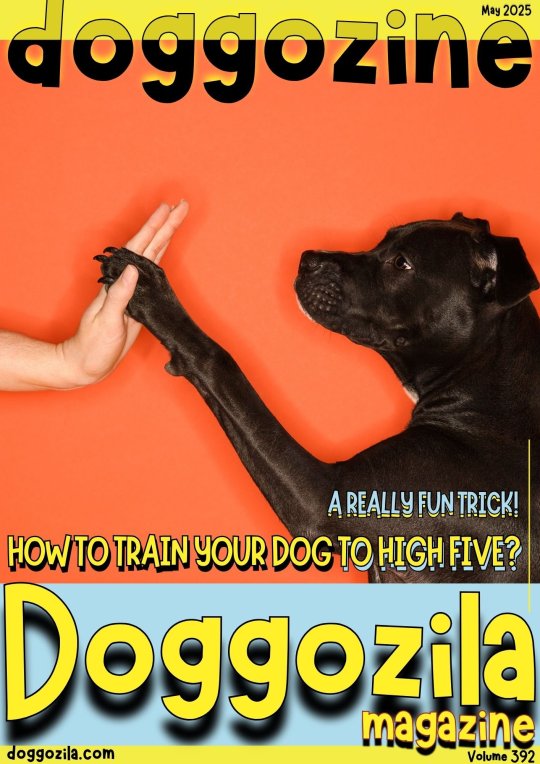


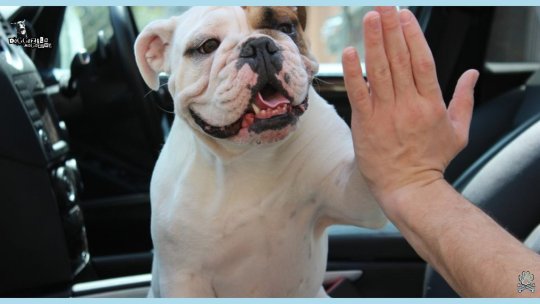

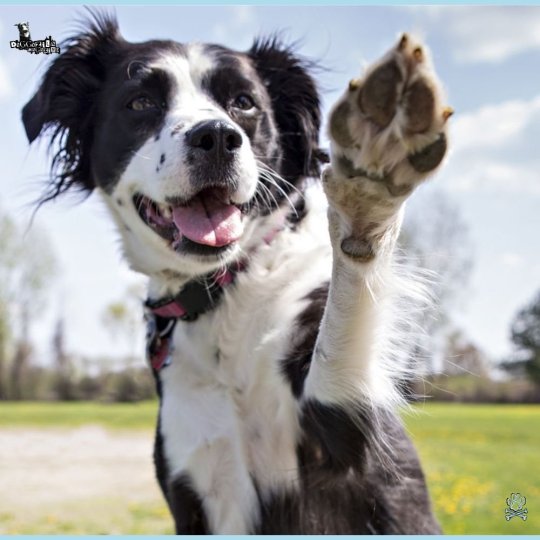
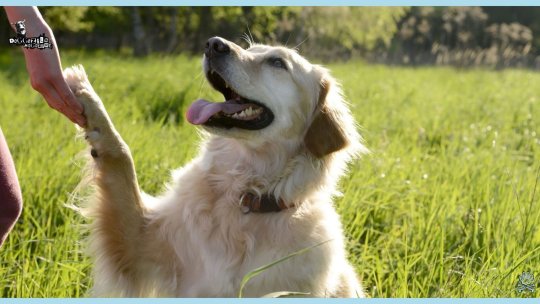

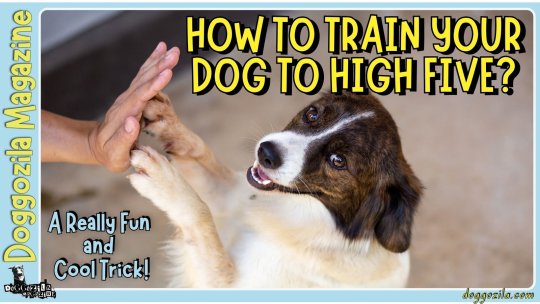
(via How to Train Your Dog to High Five? A Fun Trick! - Doggozila Magazine)
#Dog Training#Dog Training tips#Dog Training article#Puppy training#Puppy training tips#How to train your dog#Teach your dog to High Five#Dog magazine#Dog trainer#Dog life#Dog parks#Dog world#Dog blog#Dog Lifestyle#Dog Adventures#Dog community#Doggie Delight#Doggos
4 notes
·
View notes
Text
Master the Art of House Training Your Puppy
Bringing a new puppy into your home can be an exciting and joyful experience. However, with this new addition comes the responsibility of properly training them, starting with one of the most important aspects: house training. While it may seem like a daunting task, mastering the art of house training can lead to a well-behaved and happy pup, as well as a clean and stress-free home. It requires patience, consistency, and a solid understanding of your puppy's behavior and needs. In this article, we will guide you through the process of house-training your puppy, providing you with expert tips and techniques to ensure success. Whether you are a first-time puppy owner or looking to improve your training skills, our comprehensive guide will equip you with the knowledge and tools to confidently master the art of house training. From establishing a routine to addressing accidents, we will cover all aspects of this essential training, allowing you and your puppy to build a strong bond and create a harmonious living environment. So, let's dive in and start your journey towards a well-trained and well-mannered furry companion.
1. Consistency is the key to success.
Establishing a consistent routine and following through with it is crucial for successfully housetraining your puppy. This means taking your puppy out to the designated potty spot at the same times every day, praising and rewarding them for going to the appropriate place, and being patient and understanding when accidents happen. It may take some time and effort, but consistency shows your puppy that you are a reliable leader and helps them learn what is expected of them. Remember, consistency is not just about the physical routine but also about being consistent with your reactions and responses to your puppy's behavior. This will help them understand what is right and wrong, leading to a well-trained and well-behaved pup.
2. Establish a designated potty area.
Along with establishing a consistent routine, another crucial step in house training your puppy is to establish a designated potty area. This is important for both the puppy and their owner, as it creates a clear and consistent location for the puppy to relieve themselves. This designated spot should be easily accessible and safe for the puppy to use, and it should be consistently used every time they need to go. By establishing a designated potty area, you are setting clear boundaries and expectations for your puppy and helping them learn where and when it is appropriate to relieve themselves. This is a crucial aspect of mastering the art of housetraining your puppy and will lead to a more well-behaved and obedient companion.
3. Set a regular feeding schedule.
Another crucial aspect of housetraining your puppy is setting a regular feeding schedule. This means feeding your puppy at the same time every day, preferably in the morning and evening. This helps regulate their digestion and bowel movements, making potty training easier. It also helps you monitor your puppy's eating habits and ensure they are getting the appropriate amount of food for their age and size. By establishing a regular feeding schedule, you are setting your puppy up for success in their potty training journey.
4. Use positive reinforcement techniques.
In addition to establishing a regular feeding schedule, it is important to use positive reinforcement techniques when housetraining your puppy. This means rewarding them with praise, treats, and affection when they successfully go to the bathroom in the designated area. Positive reinforcement is a more effective and humane approach compared to punishment or scolding, as it encourages desired behavior and strengthens the bond between you and your puppy. Be consistent and patient with your puppy, and they will learn to associate going to the bathroom in the designated area with positive rewards. This will ultimately make the house training process easier and more enjoyable for both you and your furry friend.
5. Supervise your puppy at all times.
In addition to using positive reinforcement techniques, it is important to supervise your puppy at all times during the house training process. This means keeping a close eye on them and not allowing them to roam freely around the house without your supervision. This may require keeping them on a leash or in a designated area where you can easily monitor them. By doing this, you can quickly catch any accidents and redirect your puppy to the designated bathroom spot. It also helps your puppy develop a routine and understand that going to the bathroom should only happen in the designated area. This practice will not only speed up the house training process but also prevent any accidents from occurring in the house. Remember, consistency and patience are key when housetraining your puppy, and supervision is an important part of that process.
6. Establish a consistent routine.
Consistency is key when it comes to successfully house-training your puppy. This means establishing a routine for your puppy that includes regular potty breaks, mealtimes, and playtime. By following a consistent schedule, your puppy will learn when to expect bathroom breaks and will be less likely to have accidents in the house. It is important to stick to this routine as much as possible, even on weekends or when you have a busy schedule. This will help your puppy understand the expectations and speed up the house training process. Additionally, a consistent routine can also help with other aspects of your puppy's behavior and training. By establishing structure and consistency in their daily routine, they will feel more secure and confident, making them easier to train and manage in the long run.
7. Reward good behavior immediately.
One important aspect of housetraining your puppy is to reward good behavior immediately. This means giving praise, treats, or other rewards as soon as your puppy successfully goes to the bathroom outside or follows a command. Timing is crucial in reinforcing positive behavior and helping your puppy understand what is expected of them. By rewarding good behavior immediately, you are providing clear and consistent feedback to your puppy, which will ultimately lead to better and faster results in house training. Remember to always have treats or other rewards on hand and be ready to give them as soon as your puppy behaves well. This will help them associate good behavior with positive consequences, making them more likely to continue following your training.
8. Clean up accidents properly and promptly.
Accidents are bound to happen during the house training process, especially with young puppies. It is important to clean up these accidents properly and promptly to avoid any lingering smells or stains that could attract your puppy back to the same spot. Use an enzymatic cleaner specifically designed for pet messes, as these will break down the organic compounds and eliminate any remaining odors. Avoid using ammonia-based cleaners, as they can actually attract dogs back to the same spot. It is also important to clean up accidents as soon as possible to prevent your puppy from developing the habit of going to the bathroom indoors. By consistently cleaning up accidents properly and promptly, you are setting your puppy up for success in their house training journey.
9. Be patient and avoid punishment.
Consistency and patience are key when it comes to house-training your puppy. Punishing them for accidents will only confuse and scare them, hindering their progress. Instead, focus on positive reinforcement and rewards when they successfully go to the bathroom outside. This will help them understand what behavior is expected of them and motivate them to continue making progress. Remember, house training takes time, and accidents are bound to happen. Stay calm and be patient, and your puppy will eventually learn to go to the bathroom outside. With consistent training and positive reinforcement, you can master the art of housetraining your puppy and create a happy and clean home for both you and your furry friend.
10. Seek professional guidance if needed.
In some cases, despite your best efforts, your puppy may still struggle with house training. This could be due to various factors, such as medical issues, fear or anxiety, or previous negative experiences. If you find yourself struggling to successfully housetrain your puppy, seek professional guidance from a veterinarian or certified dog trainer. They can help identify any underlying issues and provide personalized advice and training techniques to help your puppy succeed. Remember, every dog is unique and may require different methods, so don't be afraid to reach out for professional help if needed. With patience and professional guidance, you and your puppy can master the art of house training and create a happy and clean living environment.
In conclusion, house training your puppy is an essential and often challenging aspect of dog ownership. However, with patience, consistency, and positive reinforcement, you can successfully teach your puppy to relieve themselves in appropriate areas. Remember to keep a regular schedule, reward good behavior, and be patient with accidents. With these tips and techniques, you can master the art of housetraining your puppy and foster a strong bond with your furry friend.
FAQ
1. What are some effective techniques for housetraining a puppy?
Some effective techniques for house training a puppy include creating a consistent routine for feeding and outdoor bathroom breaks, using positive reinforcement such as treats and praise when they go outside, supervising them closely indoors to prevent accidents, and using crate training to establish a den-like space where they can learn to hold their bladder. It's important to be patient and consistent and avoid punishment-based methods, as this can confuse and scare the puppy. Consistency, positive reinforcement, and a lot of patience are key to successfully housetraining a puppy.
2. How long does it typically take to fully housetrain a puppy?
Housetraining a puppy can typically take anywhere from a few weeks to a few months. The time it takes depends on various factors, such as the breed, age, and individual puppy's temperament, as well as consistency and patience from the owner. Establishing a routine, rewarding positive behavior, and providing ample opportunities for bathroom breaks are important in the training process. It is crucial to remember that each puppy is unique, so the timeline may vary.
3. Are there any specific breeds that are easier or more difficult to housetrain?
Yes, there are certain breeds that are generally easier or more difficult to housetrain. Breeds like the Labrador Retriever, Golden Retriever, and Poodle tend to be more easily trainable and quick to learn appropriate bathroom habits. On the other hand, breeds like the Basset Hound, Dachshund, and Afghan Hound may be more challenging to housetrain due to their independent nature or stubbornness. However, it's important to note that individual dogs within any breed can vary, and successful house training ultimately depends on consistent training, patience, and positive reinforcement from the owner.
4. What are some common mistakes that puppy owners make during the house training process?
Some common mistakes that puppy owners make during the house training process include inconsistency in the training routine, not rewarding the puppy for going in the correct spot, punishing the puppy for accidents, not supervising the puppy enough, and not properly cleaning up accidents. These mistakes can lead to confusion for the puppy, slow down the training process, and potentially create long-term behavioral issues. It's important for puppy owners to be patient, consistent, and positive during the house training process to set their puppy up for success.
5. How can you prevent accidents and encourage good bathroom habits in your puppy?
To prevent accidents and encourage good bathroom habits in your puppy, it is essential to establish a consistent routine. Take your puppy outside frequently, especially after meals, naps, or playtime, to give them an opportunity to relieve themselves. Reward your puppy with praise and treats when they do their business outside. Supervise them closely indoors and watch for signs they need to go, such as sniffing or circling. If you catch them in the act of having an accident, interrupt them calmly and take them outside immediately. Clean accidents thoroughly with an enzymatic cleaner to remove any lingering scent. Consistency, positive reinforcement, and patience are key to successful potty training.
#puppy training#dog training#puppy house training#dog training tips#how to house train a puppy#puppy training tips#puppy training basics#how to train a puppy#easy puppy training#best puppy training#german shepherd puppy training#puppy training 101#puppy potty training#puppy training video#house training a puppy#potty training#how to potty train a puppy#puppy training course#puppy house training tips#puppy house training apartment
2 notes
·
View notes
Text
#dog training#puppy training tips#adult dog training#dog obedience command#dog training sessions#through the leash
0 notes
Text
Puppy potty training tips PLEASE
This girl. Is a MENACE. I have taken her outside so many times. So, so many times. And she won’t pee out there. We come back inside and she pisses on my rug. I caught her once and picked her up mid-squat (though she had peed a bit already) to hurry her outside and she didn’t pee out there, so I brought her back inside and you know what she did? Peed on my rug.
#dog training#puppy#puppy training#help#send help#please help#dog training tips#puppy training tips#dogs#puppies
0 notes
Text
Rescue Dogs: 5 tips to plan your responsible adoption
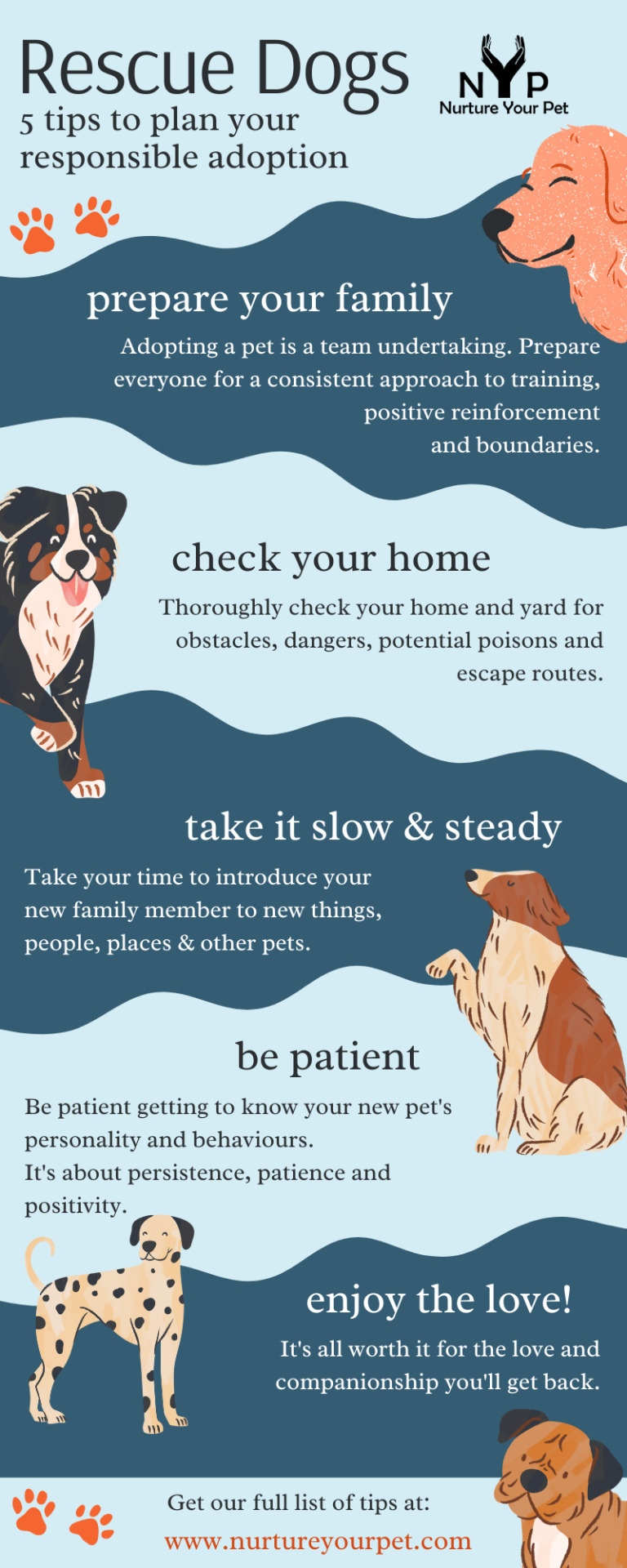
Adopting a rescue dog can be a life-changing experience, both for you and the dog. To ensure a smooth transition and a happy future together, it's important to plan your adoption responsibly. At Nurture Your Pet, we understand the significance of this decision and offer these five essential tips for pet lovers considering adoption. For more tips and advice on pet care and responsible adoption, visit our website Nurture Your Pet. Join our community of dedicated pet lovers and ensure your rescue dog enjoys a happy, healthy life with you.
1 note
·
View note
Text
Teach your dog to come with these essential games!
ROCKET RECALLS TAKE TEAMWORK Train your dog to come for a better relationship Training Your Dog To Come When You Call Training your dog to come when you call is one of the best gifts you can share with him. A dog with a reliable recall gets to enjoy time off-leash. He gets to have more fun than a dog that has to be leashed all the time. He also gets to enjoy a more connected relationship with…
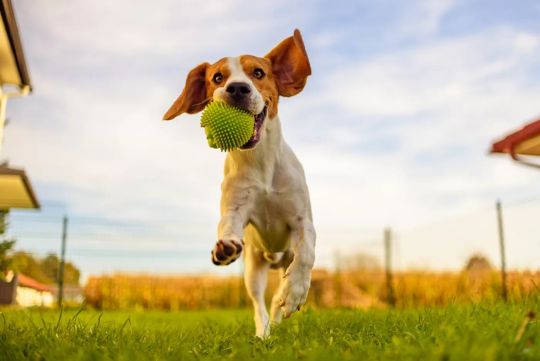
View On WordPress
0 notes
Note
I HAD TO DRAW YOUR COMMENT

IM SCREAMING AAAAA YOU DREW THEM SO PERFECTLY???? 😭😭😭💖💖💖💖
Valerius seems well trained until the first word out of his mouth are “but also consider: she’s ugly?” to which he gets smacked with a rolled up tabloid and has to sit outside dndkdkkdjdjdj
23 notes
·
View notes
Text

Stop wrongly blaming dogs! 🐶 They might actually be saying 'I like you' when you think they're misbehaving. Here are four surprising meanings behind dog behaviors that are often misunderstood:
Humping: humping is often not about being in heat, especially for female or neutered dogs when a dog humps your leg they're likely seeking your attention and companionship. It's a common play behavior among dogs, and humping other dogs or objects could be a way of showing dominance.
Shaking: After petting a dog, you often see them vigorously shaking their bodies as if annoyed by their fur being messed up. But the truth is, most of them actually enjoy being petted and get very excited! So, they shake their bodies to release their excitement, calm themselves down, and stretch their bodies.
Yawning: When a dog yawns while being scolded, it's not because they're bored or not sorry. More likely, they know they made a mistake. Dogs yawn to relieve tension and stress, just like when humans take deep breaths to calm themselves down. Dogs also use yawning as a way to say 'hey, I mean you no harm' when they encounter other aggressive dogs and want peace.
Licking: When a dog keeps licking its mouth or licking the air, it's not because of food. It's because they feel uneasy or nervous. That's when you should figure out what's causing their discomfort. Follow for more facts and tips; enjoy it!
17 notes
·
View notes
Text
I have a work term student from a service dog college program in Medicine Hat and she says the puppy raisers are encouraged to watch Bluey with their dogs, and the dogs grow up understanding about tv and turn into tablet kids that can be entertained by giving them a tablet and turning on a show.
I love everything about this.
Here I am, keeping dogs from getting bored with stinky messy kongs like a sucker.
2 notes
·
View notes
Text
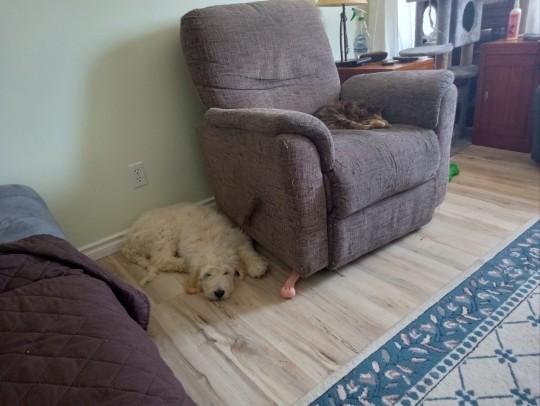
Puppy time is exhausting for all the humans and cats so far but hey we're still just starting and she can't go for any walks yet, she goes to the vet Monday so we can start doing outings at lower risk locations to work on both socialization getting used to the car and also getting some of the puppy energy out somewhere that she isn't going to get distracted by a cat and try to play with them. She did that earlier while Peanut was napping on the chair and got a pretty good swat for it that sent her yipping she'll probably get a few of those yet before she understands the cats really aren't going to respond to that kind of behaviour and once that really settles into her brain what I consider the worst of it will be over. It's post lunch nap time right now though, we are currently doing three feedings a day to spread it out into smaller meals. We also finally have a dog that likes that orange chew it's strong but has a lot of give so she's finding it satisfying to chew, Luna never liked it and none of my brother's dogs were ever interested in it.
#dogblr#puppy#yes i know she needs more brushing its a work in progress her back and shoulders are decent#but her hips and down her legs and tail still need brushing out theres nothing truly snarled so I'm not pushing it#also if anyone has tips for tooth brush training please share ive never done it before but very much am going to try this go around
2 notes
·
View notes
Photo

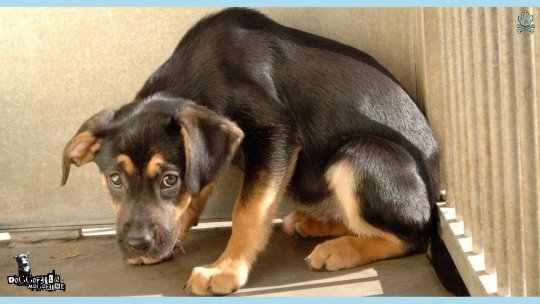






(via Puppy Fear Periods: Help Your Dog To Be Confident and Fearless - Doggozila)
#Dog fear#Fear in dogs#Dog training#Puppy training#Puppy training tips#Dog care#Dog magazine#Dog lover#Dog life#Dog blogger#Dog lifestyle
4 notes
·
View notes
Text
Brain Dog Trening
Ask me how traine the dog? A well-trained dog is a happy dog. AND a happy dog makes for a happy owner.
#how traine dog brain at home #brain dog training #dog brain training toys #dog brain training games #brain training your dog #dog brain training exercises
#brain#puppies#dog#dog brain training exercises#brain training for dog#brain dog training#skincare tips
2 notes
·
View notes
Text
Boxer Dog Health Common Issues and Preventative Care
Learn about the most common health concerns that affect Boxer dogs and discover preventive measures to keep them in top shape.
Boxers are known for their loving personalities and loyalty. But what you may not know is how important preventative care is for keeping your Boxer healthy. As your trusted companion, it’s essential to be aware of the common health issues that can afflict a Boxer and what preventative measures you can take to ensure your Boxer stays healthy and happy. In this guide, we’ll explore the boxer’s…

View On WordPress
#Boxer dog common issues#Boxer Dog Health#Boxer dog health care tips#Boxer dog health maintenance#Boxer dog health problems and solutions#Boxer dog healthBoxer dog common issues Boxer dog preventative care Boxer dog health problems Boxer dog health tips Boxer dog care guide Box#Boxer dogs Pet care Training Health Nutrition Breed characteristics Boxer puppies Exercise Grooming Socialization
2 notes
·
View notes
Text
5 Essential Pet Care Tips from Nurture Your Pet
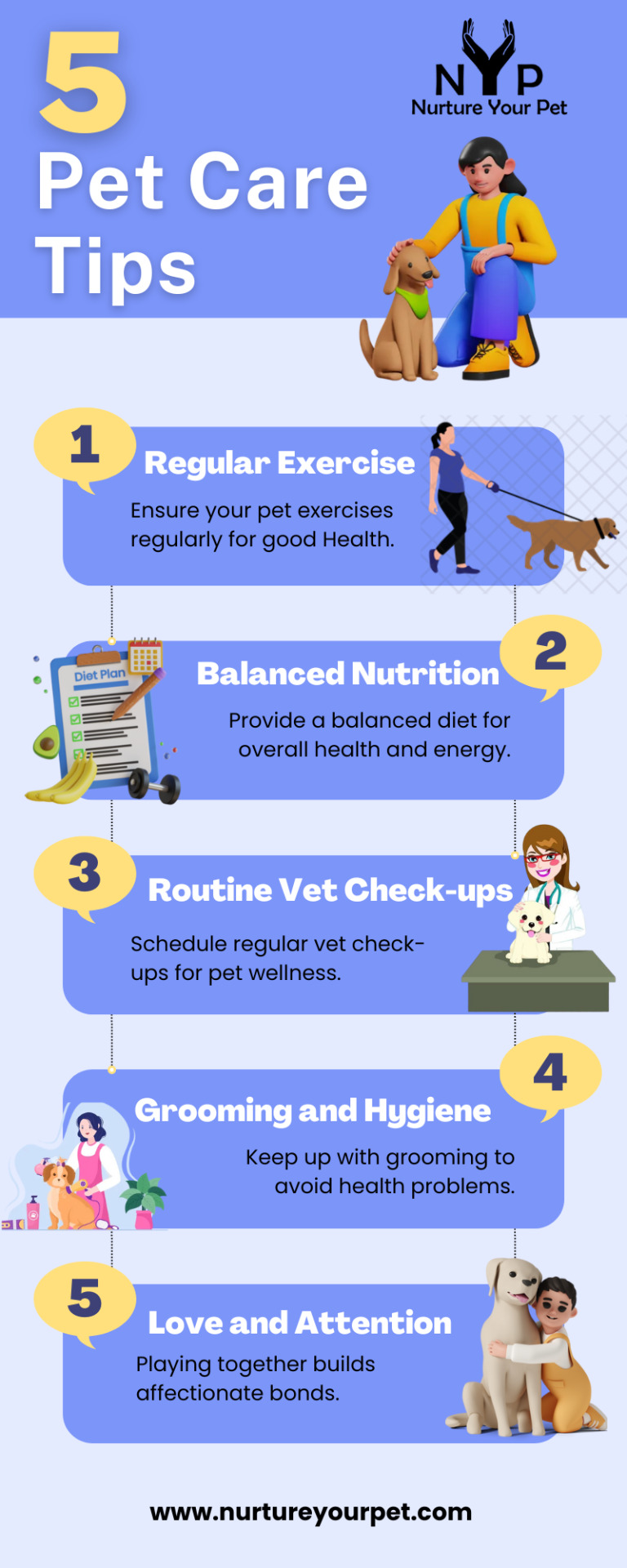
Discover the top 5 essential pet care tips to keep your furry friend healthy and happy. Visit Nurture Your Pet for expert advice and comprehensive guides on pet care. For more detailed information and additional pet care tips, explore our articles and resources at Nurture Your Pet.
1 note
·
View note
Text
How To Potty Train A Puppy Fast
How To Potty Train A Puppy (Or Adult Dog) What is the easiest, fastest way to potty train a puppy? Potty training your new puppy is easy if we give the puppy what he needs to learn. It’s important to follow a plan that sets your puppy up for success by preventing accidents (as much as possible) and heavily rewarding the action of eliminating outdoors. Here are 6 easy steps that make it easy for…
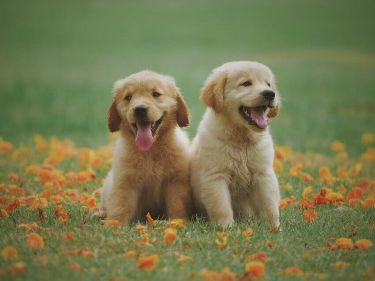
View On WordPress
#Go dog go dog training#house training#lynne fedorick#my dog geek.com#potty training#Puppy#puppy behaviour problems#puppy learning#puppy pee#Puppy training#puppy training tips#Stubborn puppies#super puppy
0 notes
Text

Ever wondered why some people are a magnet for dogs? 🐕 Here are traits that make a paws-itive impression:
1️⃣ Fresh Scent: Dogs have a powerful sense of smell and dislike strong odors like cigarettes or alcohol. A clean, natural scent is more inviting. 🌿
2️⃣ Familiar Smell: If you smell like another dog (or your own), dogs see you as safe and friendly—almost like one of their pack! 🐶
3️⃣ Gentle Nature: Dogs sense emotions and respond to soft tones and calm vibes. A mild approach makes them feel secure. 💕
4️⃣ Playful Energy: Dogs love social, interactive people. If you smile, make eye contact, or show goodwill, they'll be all over you! 😊
💡 Pro Tip: Dogs sense stress, so staying relaxed helps put them at ease. Be kind, calm, and interactive, and you’ll have a furry friend for life! 🐕✨
FOLLOW FOR MORE!!!!
#petlove#dogs#dog#dogs of tumblr#dog health#dog training#dog breed#puppy#chihuahua#dog tips#dog lover#dog art
5 notes
·
View notes